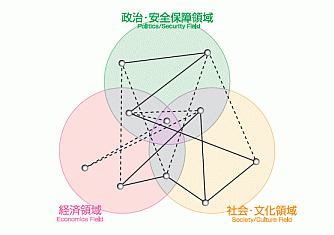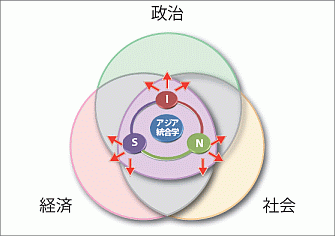Creation of Asian Regional Integration Studies
Realignment of Research Foci
GIARI is unique not only because it carries out pioneering research in its three core disciplines of politics, economics and social studies, but also because it brings researchers from these areas together into an integrated field of joint research — in the space where three disciplines link and overlap. This integrated research approach has allowed GIARI to focus on clarifying the mutually inter‐dependent structure of Asian regional integration and work towards constructing a new theory of regional integration. However, there has been a lack of attention paid towards how best to systemize the governance of each discipline.
Spring 2009 presented an opportunity to reflect upon GIARI's performance up until now, and resulted in the decision to reshuffle the various disciplines into a clearer format, to clarify the issues to be tackled by each field, and to set out GIARI's key concepts.


Three Research Foci and Three Key Concepts
Political Integration and Identity Group (I)
Principle obstructions to political integration in the Asian region include historical relations and security issues. Any mutual mistrust that lingers must be overcome; the creation of a new, shared identity is key, and this can be achieved by building up cooperative and collaborative relationships. The Asia‐Vision Survey, which began in autumn 2009, will serve to clarify this identity.
Economic Integration and Sustainability Group(S)
De facto economic integration is a reality; the rapid shift towards capital markets has caused deepening problems, such as widening gaps in income and environmental destruction. As a result, the very nature of development has been called into question. Focus must now fall upon the formation of mutually complementary relationships of economic and environmental cooperation. Research will focus on the keywords of environmental, economic and social sustainability.
Social Integration and Networking Group(N)
A distinguishing characteristic of international labor migration throughout the Asian region has been how the creation of a de facto network has preceded any legal systemization. This network goes beyond regional or ethnic ties, incorporating interrelationships between mutually dependent persons, and independent networks of NGOs, citizens (laypersons, intellectuals, exchange students) and think tanks.
GIARI model
Behind the creation of this new integrated discipline is an attempt to create the GIARI model, as a new academic field of Asian Regional Integration Studies. The GIARI model is intended to feed into the GIARI method, thus intensifying the relationship between research and human resources training.
Probing the Future of Renewed Asian Regional Integration—From the Asia Student Survey to the Asia‐Vision Survey—
In 2007, GIARI carried out the Global Comparative Survey on Attitudes amongst Asian Students (or Asia Student Survey), a large‐scale survey which comprised of individual interviews with 400 university students from six Asian countries. The survey allowed GIARI to gather a clear picture of the impressions of regional integration held by students throughout Asia, and to identify those feelings shared pan‐regionally and those which differed by area. The results helped to clarify the scope and content of Asian regional integration. The Asia‐Vision Survey, launched in 2009, is a continuation of this. This survey seeks to discover the effects of phenomena such as the expansion of global mutual interdependencies and regional Asian development on the formation of identity in undergraduate and graduate students at leading universities throughout Asia. It also seeks to generate a vision for the Asia of the future.
